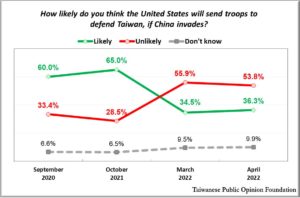Is the United States committed to defending Taiwan if China attacks? Different pundits will tell you differently. But the majority of Taiwanese people themselves appear to focus less on what US officials or pundits say, and more on what they see or perceive the United States would do.
In a recent remark, President Joe Biden emphatically proclaimed that he would commit to defend Taiwan militarily if it were ever attacked by China. The comment was widely discussed by various media and pundits, particularly those US supporters of Taiwan who enthusiastically interpreted it as a rare public acknowledgment of the actual US defense commitment to defend Taiwan. For the “supporters of Taiwan” camp the commitment was never in doubt, but the US hesitancy to acknowledge it explicitly was merely due to the need for political and diplomatic expediency vis-à-vis China.
Officially the White House quickly walked back from Biden’s statement and reiterated that the US government is only committed under the Taiwan Relations Act to “provide Taiwan with the military means to defend itself” and that the US policy “has not changed.” After all the pomp and circumstance, we are apparently back to square one.
What do the Taiwanese think about the US commitment to come to their defense if China attacks?
TAIWANESE VIEWS
The Taiwanese Public Opinion Foundation, an independent, non-partisan public opinion and policy research organization in Taiwan, has conducted opinion polling in Taiwan for years and as a result, has a large amount of data tracking every aspect of Taiwanese public opinion.
One of the issues we tracked is whether the Taiwanese people themselves believe that the United States will intervene militarily in the case of an invasion from China. In our April 2022 poll, we found among Taiwanese adults aged 20 years and older, a majority of 53.8% do not believe there will be a US military intervention while only 36.3% said they do.
This is similar to our March 2022 poll when we found that the Taiwanese majority’s confidence in a US military intervention had decisively turned skeptical this year. In our previous polls from 2021 and 2020, 60% or more of the Taiwanese public believed in the likelihood of a US intervention.
The March 2022 poll was conducted on March 14–15, just two weeks after Russia invaded Ukraine. The lack of a direct US military intervention to help Ukraine (despite all kinds of military and non-military aid, intelligence sharing, and other assistance) had a major impact on the Taiwanese public’s confidence in US military intervention and drove a significant number, as much as a quarter of the Taiwanese, toward non-confidence.
Among Taiwan’s ‘government workers,’ a category that includes servicemembers of the military, a whopping 70% have no confidence in US intervention.
The reversal is even more interesting when one considers that since Russia invaded Ukraine in February 2022, our polls found the mass majority of the Taiwanese public has been very sympathetic toward Ukraine and is highly supportive of Western-led sanctions against Russia. The Taiwanese public’s perceptions of Russia’s invasion have also been influenced by US and Western media reporting that highlighted many of Ukraine’s successes and Russia’s failures. US assistance to Ukraine has also been prominently reported by Taiwan’s media. Yet, all of these factors combined still failed to boost Taiwanese confidence in US intervention.
The April 2022 poll also showed that among the supporters of the ruling Democratic Progressive Party, a majority still believes in US intervention, while supporters of the major opposition party, the Kuomintang, and those who identified as independents, are overwhelmingly skeptical of US intervention. Furthermore, those with college or higher education attainments are relatively more skeptical of US intervention, while those with just high school or middle school education are relatively more confident in US intervention, though skeptics remain the majority.
Finally, among Taiwan’s “government workers,” a category that includes servicemembers of the military, a whopping 70% have no confidence in US intervention. The caveat here is that our surveys do not specifically list soldiers as a category of professions, and they consist of only a small portion of the total government workers. However, the fact that the men and women who serve and operate Taiwan’s bureaucracy and military have little confidence in US intervention is in itself an important indicator.
VALUING ACTIONS OVER WORDS
There are several important takeaways from the March and April 2022 polls. First, the majority of Taiwanese people themselves are acutely aware that the so-called “US commitment” to Taiwan’s defense is nowhere guaranteed and their confidence in the United States is easily shaken by their perceptions of changing world events. This is despite the ruling government’s every effort in domestic messaging boasting its good relations with the United States and promises of “strong support” from Washington is all but assured if China invades.
Second, the Taiwanese people probably care less about the statements made by US leadership and officials than many commonly assumed. Among Western pundits writing about Taiwan, few of which have shown any interest in the actual Taiwanese public opinion, the supporters or opponents of so-called “strategic ambiguity” argue endlessly whether a clear, unequivocal verbal commitment on the part of the United States to defend Taiwan would be a good or bad thing.
But Taiwanese people likely see US actions as more important than words. The same can also be said about Beijing itself, which continues to invest more and more each year in expanding and upgrading its People’s Liberation Army, which now possesses multi-dimensional advantages in numerical and qualitative terms over Taiwan’s military — and even that of the US military.
If the United States were to assure the Taiwanese people of its actual commitment to deter a Chinese invasion of Taiwan, it should start by strengthening its own military and strategic posturing. It might also do some good by urging Taiwan to seriously reform its dysfunctional military rather than just pushing for more ill-conceived US arms sales. After all, the majority of Taiwanese themselves already realized they must be prepared to defend against China alone and not count on some vague promises of “intervention” from the United States, which for many only exist in words.
Paul Huang is a research fellow at the Taiwanese Public Opinion Foundation, an independent, non-partisan public opinion and policy research organization in Taiwan.






















